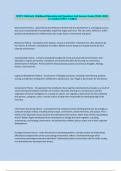MTTC 106 Early Childhood Education test| Questions And Answers Latest {2024- 2025}
A+ Graded | 100% Verified
Maturalionist Theory - advanced by Arnold Gessell. Believe that the development is a biological process
that occurs automatically in predictable, sequential stages over time. The rate varies. Believes a child's
growth and development is influenced by two major forces: environment and genes.
Behavioral Theory - Founded by John Watson, known as the father of behaviorism. Was advanced by
Ivan Pavlov, B.F Skinner, and Edward Thorndike. Believe human beings are shaped entirely by their
external environment
psychoanalytic theory - A theory developed by Sigmund Freud and advanced by Erik Erikson, that
attempts to explain personality, motivation, and mental disorders by focusing on unconscious
determinants of behavior. Primary belief is that all people possess unconscious thoughts, feelings,
desires, and memories.
cognitive development theory - construction of thought processes, including remembering, problem
solving, and decision making from childhood to adolescence. Jean Piaget is best known for this theory.
Sociocultural Theory - the approach that emphasizes how cognitive development proceeds as a result of
social interactions between members of a culture. Describes learning as a social process and the
origination of human intelligence in a society or culture. Lev Vygostky is best known for this, believing
that parents, caregivers, peers, and the culture at large were responsible for developing high order
functions.
information processing theory - a perspective that compares human thinking processes, by analogy, to
computer analysis of data, including sensory input, connections, stored memories, and output. This is
based on the idea that humans process the information they receive, rather than merely responding to
stimuli. Robert Siegler developed three mechanisms of change that work together: encoding,
automaticity, and strategy construction. He believed that children play an active role in their cognitive
development.
Ecological System Theory - views the person as developing within a complex system of relationships
affected by multiple levels of the surrounding environment. Offers a framework though which
community psychologists examine individuals' relationships within communities and the wider society.
Urie Brofenbrenner developed this theory.
, Atypical Development - When development doesn't follow the normal course. It could include things like
learning and social disabilities and disorders.
Typical Development - the natural process of maturing or acquiring skills ranging from simple to more
complex. This follow the 'normal' course
Cognitive Growth/Development - changes in how children think, explore, and figure things out. It is the
development of knowledge, skills, problem solving, and dispositions, which help children to think about
and understand the world around them.
Social Emotional Development - process through which children acquire the capacity to understand,
experience, express, and manage emotions and to develop meaningful relationships with others.
Language Development - a timeline for acquisition of benchmarks in verbal communication. Higher level
cognitive skill involving audition and oral abilities in humans to communicate verbally their wants and
needs.
aesthetic - concerned with beauty or the appreciation of beauty
5 basic needs - life, caring, control, purpose, happiness
'Needs' - something you must have to survive; water, food, shelter
'Wants' - something you desire but can live without
How can one developmental domain affect another? - Developmental domains are interlined and
interrelated so that a child's process in one domain influences the process in other domains.
Interlink - join or connect together
Interrelate - connect to one another




